《英语修辞学》第十章
- 格式:ppt
- 大小:658.50 KB
- 文档页数:53
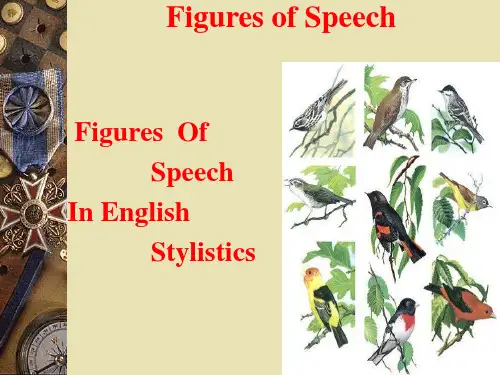
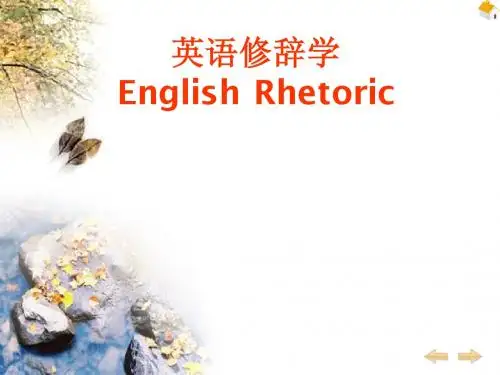
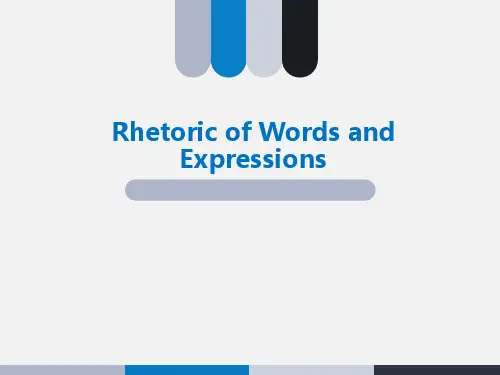
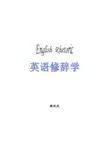
蔡岚岚Why Do We Learn Rhetoric?•To understand the author’s intention better.•To find out the common ways people know the world and ways people express themselves.•To appreciate the beauty, explicit or not, of the language.•To learn how to achieve an effective communication.Introduction to Rhetorical Devices1. Phonetic Devices1.1 Alliteration 头韵Eg. a rolling roadtongue twisters: She sells seashells on the seashore.Peter piper picked a peck of pickled pepper.1.2 Euphony 谐音Eg. hate- late; powers- flowers1.3 Assonance 半谐音Eg. Thou still unravished br i de of qu i etness,Thou foster ch i ld of s i lence and slow t i me.(Keats: Ode on a Grecian Urn)a coffin shop-- a coffee shop; a flowery dell-- a flowery cell1.4 Onomatopoeia 拟声Eg. dog: bay, snarl, growl, howl, whine…1.5 Homeoteleuton 叠韵: similarity in endingsEg. Instead of rivets there came an inva sion, an inflic tion, a visita tion.To Bertie, Jeeves is as incomprehen sible as he is indispens able.2. Lexical Devices2.1 Lexical Options2.1.1 Short Words and Long Words2.1.2 Common Words and Learned WordsEg. payment- liquidation; refer to- allude to; glasses- spectacles;name/ surname- cognomen2.1.3 Formal, Informal or Colloquial WordsEg. deception- trick- rip-off; residence- house- digs;commence- start/begin- kick off2.1.4 General or Specific WordsEg. (n.) the building- the library; big cities- Shanghai, New York, London;(adj.) a fine day- sunny, warm, cloudless(adv.) speak well- clearly, with perfect diction;(v.) walk- stroll, march, stride; stagger2.1.5 Concrete or Abstract Words2.1.6 Referential or Emotive Words2.1.7 Choice between Synonymous WordsEg. fat- stout; high- tall; wide- broad; thin- lean2.2 Choice of Abbreviations2.2.1 Acronyms2.2.1.1 initialism: UN; WTO2.2.1.2 part of a word: TV; ID2.2.1.3 an expression or sentence: DINK; ASAP(asap); AWOL(awol);MARLBORO2.2.1.4 number or similar sound: F2F; Gr82.2.2 Clippings2.2.2.1 first syllable: advertisement, laboratory, professor, automobile2.2.2.2 middle syllable: flu (influenza), fridge (refrigerator)2.2.2.3 last syllable: omnibus, telephone, internet, airplane2.2.3 Blendsbrunch: br eakfast+ l unch; digicam: dig ital+ cam era; newscast: news+ broad cast2.3 Lexical Repetition3. Syntactic Devices3.1 Long and Short Sentence3.2 The Simple Sentence3.3 The Compound Sentence3.4 The Complex Sentence3.5 Syntactic Scheme of Inversion3.6 Syntactic Scheme of Omission3.7 Syntactic Scheme of Addition or Insertion3.8 Syntactic Scheme of Repetition3.9 Syntactic Scheme of Climax and Anti-climax3.10 Rhetorical Question3.11 Apodioxis3.12 ApostropheGeneral principles and features of English & Chinese rhetoric1.英语关系词丰富,介词、连词、关系代词和关系副词等的充分利用,使英语成为一种更为形式的语言,即以形合为主的语言。
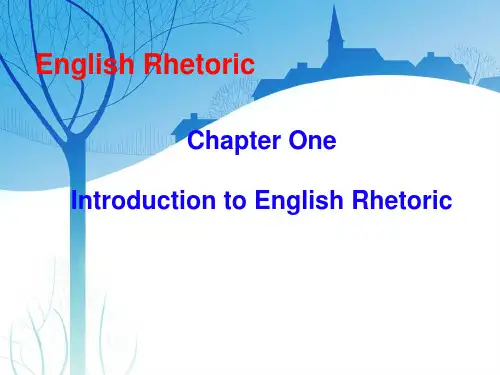
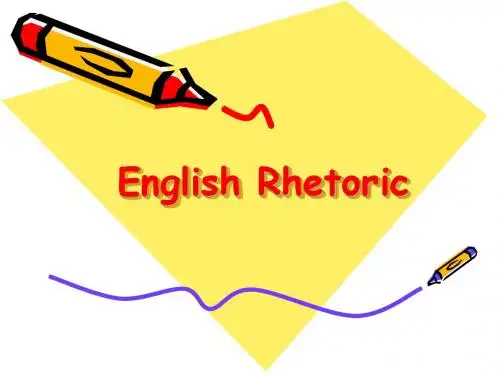
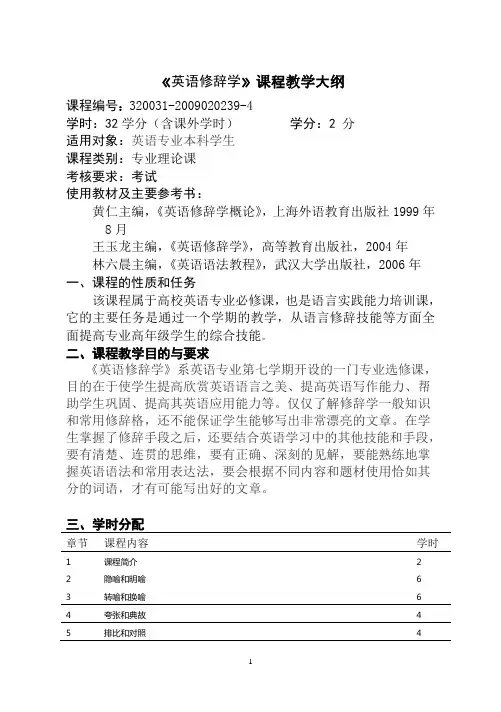
《英语修辞学》课程教学大纲课程编号:320031-2009020239-4学时:32学分(含课外学时)学分:2分适用对象:英语专业本科学生课程类别:专业理论课考核要求:考试使用教材及主要参考书:黄仁主编,《英语修辞学概论》,上海外语教育出版社1999年8月王玉龙主编,《英语修辞学》,高等教育出版社,2004年林六晨主编,《英语语法教程》,武汉大学出版社,2006年一、课程的性质和任务该课程属于高校英语专业必修课,也是语言实践能力培训课,它的主要任务是通过一个学期的教学,从语言修辞技能等方面全面提高专业高年级学生的综合技能。
二、课程教学目的与要求《英语修辞学》系英语专业第七学期开设的一门专业选修课,目的在于使学生提高欣赏英语语言之美、提高英语写作能力、帮助学生巩固、提高其英语应用能力等。
仅仅了解修辞学一般知识和常用修辞格,还不能保证学生能够写出非常漂亮的文章。
在学生掌握了修辞手段之后,还要结合英语学习中的其他技能和手段,要有清楚、连贯的思维,要有正确、深刻的见解,要能熟练地掌握英语语法和常用表达法,要会根据不同内容和题材使用恰如其分的词语,才有可能写出好的文章。
三、学时分配章节课程内容学时1 课程简介 22 隐喻和明喻 63 转喻和换喻 64 夸张和典故 45 排比和对照 46 拟人和转移修饰法 47 长句理解 6四、教学中应注意的问题该课程英语专业高年级技能课,教学内容含量大,难度高,所以在实际教学中,教学内容应根据学生的实际水平进行调整,教学进度也应根据实际情况进行调整。
尤其要注意实际技巧的定期测试和评估,并且按照评估结果调整教学内容和进度,只有这样才能达到应有的教学目的。
五、教学内容第一章:课程简介1.基本内容:修辞学的定义和功能2.教学基本要求:通过2个学时的课堂教学实践培训,学生能基本掌握英语修辞学的定义和基本功能。
3.教学重点难点:重点是英语修辞学的定义和功能方面知识的掌握。
4.教学建议:(一)强调学生在训练的同时理解和掌握英语修辞学的定义,要通过经常收听VOA或BBC新闻,以及经常朗读和背诵规范的英语短文来提高自己的英语修辞能力。
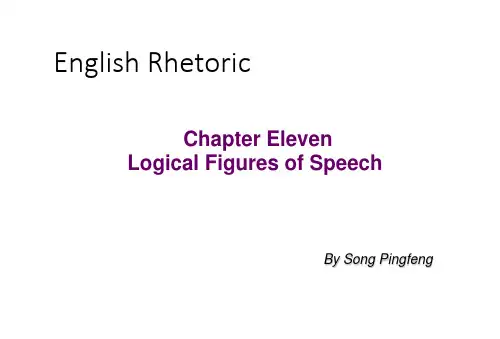
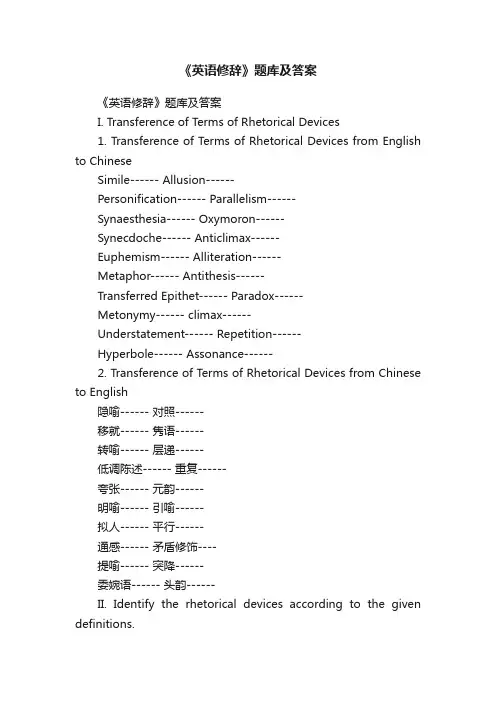
《英语修辞》题库及答案《英语修辞》题库及答案I. Transference of T erms of Rhetorical Devices1. Transference of Terms of Rhetorical Devices from English to ChineseSimile------ Allusion------Personification------ Parallelism------Synaesthesia------ Oxymoron------Synecdoche------ Anticlimax------Euphemism------ Alliteration------Metaphor------ Antithesis------Transferred Epithet------ Paradox------Metonymy------ climax------Understatement------ Repetition------Hyperbole------ Assonance------2. Transference of Terms of Rhetorical Devices from Chinese to English隐喻------ 对照------移就------ 隽语------转喻------ 层递------低调陈述------ 重复------夸张------ 元韵------明喻------ 引喻------拟人------ 平行------通感------ 矛盾修饰----提喻------ 突降------委婉语------ 头韵------II. Identify the rhetorical devices according to the given definitions.1. It’s repetition of an initial sound, usually of a conson ant or cluster, in two or more words of a phrase, line of poetry, etc.A. ParallelismB. MetonymyC. AlliterationD. Metaphor2. It’s a figure of speech containing an implied comparison, in which a word or phrase ordinarily and pri marily used of one thing is applied to another.A. MetaphorB. HyperboleC. SimileD. Personification3. It’s the humorous use of words, or of words which are formed or sounded alike but have different meanings, in such a way as to play on two or more of the possible applications; a play on words.A. AllusionB. PunC. ClimaxD. Oxymoron4. It’s a figure of speech that consists in using the name of one thing for that of something else with w hich it is associated.A. ParallelismB. MetonymyC. AlliterationD. Metaphor5. It’s a statement that is not strong enough to express facts or feelings with full force; or It’s a statement that expresse s an idea, etc, too weakly.A. ParallelismB. ClimaxC. Rhetorical QuestionD. Understatement6. It’s a figure of speech in which something of an unpleasant, distressing, or indelicate nature is described in less offensive terms, as in the expressions “under the weather” for “ill” or “passed away” for died”.A. MetaphorB. HyperboleC. EuphemismD. Parallelism7. It’s usually an implicit reference, perhaps to another work of literature or art, to a person or an event.A. AllusionB. SimileC. MetaphorD. Synecdoche8. It’s a figure of speech that consists of phrases or sentences of similar construction and meaning placed side by side, balancing each other.A. ParallelismB. AntithesisC. IronyD. Repetition9. It’s a figure of speech that combines incongruous and apparently contradictory words and meaning for a special effect.A. AllusionB. PunC. ClimaxD. Oxymoron10. It is a sentence in which the last part expresses something lower than the first. In fact, a bathetic declension from a noble tone to one less exalted. The effect can be comic and is often intended to be so.A. RepetitionB. AnticlimaxC. ParadoxD. Climax11. It’s a figure of speech in which one thing is likened to another, in such a way as to clarify and enhance an image. It is an explicit comparison.A. MetaphorB. HyperboleC. SimileD. Personification12. It’s a figure of speec h in which human qualities and abilities are attributed to inanimate objects, animals, abstractions, and eventsA. MetaphorB. HyperboleC. SimileD. Personification13. It’s a figure of speech in which a sensation produced in one modality when a stimulus is applied to another modality, as when the hearing of a certain sound induces the visualization of a certain colorA. SynaesthesiaB. AntithesisC. Oxymoron14. It’s a figure of speech in whi ch a part is used for a whole, an individual for a class, a material for thing, or reverse of any of these.A. SimileB. MetaphorC. AllusionD. Synecdoche15. It’s a figure of speech that greatly exaggerates the truth.A. MetaphorB. HyperboleC. SimileD. Personification16. The rhetorical opposing or contrasting of ideas by means of grammatically paralleled arrangements of words, clauses, or sentencesA. SynaesthesiaB. AntithesisC. OxymoronD. Metonymy17. It refers to the repeating of any element in an utterance, including sound… a word or phrase, a pattern of accents.. or an arrangement of lines…A. RepetitionB. AntithesisC. AlliterationD. Parallelism18. It’s a method of humorous or subtly sarcastic expression in which the intended meaning of the words used is the direct opposite of their usual sense.B. HyperboleC. IronyD. Simile19. It’s a literary or artis tic work that imitates the characteristic style of an author or a work for comic effect or ridicule.A. MetaphorB. PunC. SimileD. Parody20. A figure of speech in which a single word, usually a verb or adjective, is syntactically related to two or more words, with only one of which it seems logically connected.A. RepetitionB. AntithesisC. ZeugmaD. ParallelismIII. Identify the rhetorical devices employed by the boldfaced words in the following sentences.1. O dear! O dear! What shall I do? I have lost my love and my lipstick too.A. RepetitionB. AnticlimaxC. ParadoxD. Climax2. Australia is so kind, just tickle her with a hoe, and she laughs with harvest.A. MetaphorB. HyperboleC. SimileD. Personification3. My heart is like a singing bird.A. MetaphorB. ParodyC. SimileD. Oxymoron4. When Della had finished crying, she went to the window and looked out sadly at a grey cat walking along a grey fence in a grey back-yard.A. ParallelismB. AntithesisC. IronyD. Repetition5. On the 14th of March, at a quarter to three in the afternoon, the great living thinker ceased to think. He had been left alone for scarcely two minutes, and when we came back we found him in his armchair, peacefully gone to sleep but---- forever.A. MetaphorB. HyperboleC. EuphemismD. Parallelism6. O, wind, if winter comes, can spring be far behind?A. ParallelismB. ClimaxC. Rhetorical QuestionD. Understatement7. Of all the students in the class I like him the best.A. AnastropheB. AnticlimaxC. Rhetorical QuestionD. Understatement8. You can ask him for the meaning of the word. He is like a walking dictionary.A. MetaphorB. HyperboleC. SimileD. Oxymoron9. Books are the ever-burning lamps.A. MetaphorB. HyperboleC. SimileD. Oxymoron10. Money makes the mare go.A. ParadoxB. AssonanceC. AlliterationD. Simile11. There was an audible stillness, in which the common voice sounded strange.A. MetaphorB. HyperboleC. SimileD. Oxymoron12. Praise is like sunlight to the human spirit we cannot flower and grow without it.A. MetaphorB. HyperboleC. SimileD. Oxymoron13. One teacher writes that instead of drowning students’ compositions in critical red ink, the teacher will get far more constructive results by finding one or two things which have been done better than last time, and commenting favorably on them.A. ParallelismB. Transferred EpithetC. AlliterationD. Metaphor14. He looked at me with a bitter look.A. SynaesthesiaB. AntithesisC. OxymoronD. Metaphor15. ---Why are Sunday and Saturday the strongest days in a week?---Because the rest are week (weak) days.A. MetaphorB. PunC. SimileD. Irony16. All the world’s a stage, and all the men and women merely players.A. AntithesisB. HyperboleC. SimileD. Personification17. ---Why can you never expect a fisherman to be generous?---Because his business make him sell fish (selfish).A. MetaphorB. PunC. SimileD. Irony18. Women were running out to the line of march, crying and laughing and kissing the men good-bye.A. AntithesisB. HyperboleC. RepetitionD. Parallelism19. Money is a bottomless sea, in which honor, conscience, and truth may be drowned.A. MetaphorB. PunC. SimileD. Irony20.I wish I could write better.A. PunB. HyperboleC. ClimaxD. UnderstatementIV. Identify the rhetorical devices employed in the following sentences.1. Praise is like sunlight to the human spirit we cannot flower and grow without it. ( )2. One teacher writes that instead of drowning st udents’ compositions in critical red ink, the teacher will get far more constructive results by finding one or two things which have been done better than last time, and commenting favorably on them. ( )3. And, it being low water he went out with the tide.( )4. They were short of hands at harvest time.( )5. In the dock, she found scores of arrows piercing her chest.( )6. With this faith we will be able to work together, to pray together, to struggle together, to go to jail together, to stand up for freedom together, knowing that we will be free one day.( )7. The drunkard smashed the glasses, upturned the table, and hit an old woman.( )8. One mad action is not enough to prove a man mad.( )9. He intended to take an opportunity this afternoon of speaking to Irene. A word in time saves nine.( )10. No X in Nixon.( )11. All the world’s a stage, a nd all the men and women merely players.( )12. He looked at me with a bitter look. ( )13. The man is no fool.( )14. You want your pound of flesh, don’t you?( )15. The child is father of the man.( )16. Perhaps, perhaps Mera might come.( )17. A professor tapped on his desk and shouted, “Gentlemen, order!”The entire class yelled, “Beer.” ( )18. I used to organize my father’s tools, my mother’s kitchen utensils, my sister’s boyfriend s.( )19. A man from the continent was traveling in England. He had c aught a very bad cold. He coughed day and night… He put on his coat and hat and went to a chemist’s. When asked what he wanted, the traveler said, “I want something for my cow,please.”( )20. Have you ever been to an Irish Wedding? I have just returned fr om one…21. Wit without learning is like a tree without fruit.( )22. I fall upon the thorns of life! I bleed!( )23. The senator pledged to oppose war, fight poverty, protect individual freedom and name a new state flower. ( )24. It is a quarter to five in the morning, the sun has already climbed above the horizon; the birds are busy celebrating the new day and have eagerly been in search of food. ( )25.Who wouldn’t have dreamed of becoming rich overnight? ( )26. What she had said I didn’t hear. ( )V. Two or more than two rhetorical devices are used in the following sentences. Read and select the rhetorical devices in each sentence.1. Time is like a fashionable host, that slightly shakes his passing guest by the band; and with his arms stretched, a s he would fly, grasps in the comer.The welcomes ever smile, and farewell goes out sighing.A. MetaphorB. HyperboleC. SimileD. Personification2. The seed ye sow, another reaps;The wealth ye find, another keeps;The robes ye weave, another wears;The arms ye forge, another bears.A. ParallelismB. AntithesisC. AlliterationD. Repetition3. Every man has in himself a continent of undiscovered character. Happy is he who acts the Columbus to his own soul.A. SimileB. MetaphorC. AllusionD. Synecdoche4. Miss Bolo went straight home in a flood of tears and a sedan chair.A. MetaphorB. HyperboleC. SimileD. Syllepsis5. These little thoughts are the rustles of leaves; they have their whisper of joy in my mind.A. MetaphorB. HyperboleC. SimileD. Personification6. A drop of ink may make a million think.A. PunB. AntithesisC. AlliterationD. Metonymy7. How soon hath Time, the subtle thief of youth, stolen on his wing my three and twentieth year!A. MetaphorB. HyperboleC. SimileD. Personification8. She did experiments after experiments. There was failure, success, more failure, a little success, a little more success.A. MetonymyB. ClimaxC. HyperboleD. Repetition9. The mother is undergoing the joyful pain, and the painful joy of childbirth.A. HyperboleB. AntithesisC. OxymoronD. Metonymy10. Why are lawyers all uneasy sleepers? Because they lie first on one side and then on the other, and remain wide wake all the time.A. PunB. AnticlimaxC. Rhetorical QuestionD. Understatement11. A lie can travel half way around the world while the truth is putting on its shoes.A. MetaphorB. HyperboleC. SimileD. Personification12. It is useless for the sheep to pass resolutions in favor of vegetarianism while the wolf remains of a different opinion.A. MetaphorB. HyperboleC. SimileD. Personification13. He was such a marvelous teacher that whenever he recognized a spark of genius you could be sure he’d water it.A. MetaphorB. UnderstatementC. IronyD. Paradox14. Polly, I love you. You are the whole world to me, and the moon and the stars and the constellation of out space.A. PunB. HyperboleC. ClimaxD. Understatement15. Then Night, like some great loving mother, gently lays her hand at our fevered head, and turns our little tear-stained face up to hers, and smiles.A. MetaphorB. HyperboleC. SimileD. Personification16. On Sunday they pray for you and on Monday they prey on you.A. AntithesisB. ParallelismC. AlliterationD. PunVI. Revise the following sentences with the given rhetorical devices.1. David’s beloved grandfather passed away last week.2. He looked at me with a sad look.3. Sorry, my pocket can’t afford such a pair of shoes.4. I never believe until then that any meal could defeat me, but on that day I met my Waterloo.5. Her hostility melted.6. She is lovely, kind-hearted and has a quick mind.7. I was knocked down by a motorcycle, but it was not serious.8. He is a man of wide experience and who is also very popular with the farmers.9. To chew carefully and eating slowly are necessary for good digestion.10. On the train I met with a girl from my hometown and who just graduated from Tianjin University with MA degree.11. My heart is like a singing bird.12. She is as cool as a cucumber..13. They were short of hands at harvest time.14. The bad news was a dagger into her heart.15. They stormed the speaker with questions.16. He looked at me with a bitter look17. You want your pound of flesh?18. He doesn’t have an idea of his own. He just parrots what other people say.19. His grandfather passed away recently.20. Her happiness vanished like the morning dew.VII. Find the rhetorical devices employed in the following passage.AA Dream of Rainbow(1) When I was small, I often gazed into the sky, It was bright blue, with a few sheets of cloud floating. Especially after a rain,after a rain, there would appear a splendid and glamorous rainbow, which was like a great bridge hung in thesky. How I wished I had been an eagle soaring up to the bridge! I was obsessed with it. Grandma told me that in the heaven lived supernatural beings, and that it was the kind-hearted and well-behaved people who could step into the heaven through the rainbow. She taught me to be a good boy; then I would have a chance to walk on the rainbow some day.(2) It was a beautiful dream. Gradually, I grew up to be a high school student. However, I buried myself in lesson, exercises and even boring tests all day long. Day in and day out. Such a pressing routine has deprived me of my interest as well as my chance to gaze into the sky.(3) In the summer of 1998,after finished the college entrance examination, I had time for relaxing myself at last. One day, shortly after a heavy thundershower, I opened the window and then pleasant smells of the earth greeted me. I couldn’t help breathing deeply with my eyes closed. After some while, I opened my eyes satisfactorily. Just guess what I saw. The blue sky! Or rather the blue-gray sky. It seemed that I met an old friend, who had changed so much that I could hardly recognize him. I craned my head out to look for the rainbow of which I have a deep love. But to my disappointment, she didn’t appear in the sky. Why could it be that!(4) Now, I come to understand it is the pollution that made the rainbow so strange to me and compelled her to be away from me. In the past few years, economic prosperity has been greatly promoted at the cost of air and environmental pollution. As result, while people are enjoying the prosperity, they are suffering a great deal from pollution. No wonder scientists say this is therevenge of nature! It is never too late to mend anyhow. Now more and more people have become coolly aware of its harmful consequences; and effective measures have been taken for anti-pollution. I believe that pollution will be able to disappear in the near future and our sky will be able to renew its bright blue as it used to.(5) Last night, I dreamed a beautiful dream: I saw a rainbow that has been never seen for ages. Then I flew in the sky to the rainbow as lf I had wings. When I landed on such a gorgeous bridge, all supernatural beings gave me a warm welcome…Rhetorical Devices used:Paragraph(1)__________________________________________________________________________________________________________Paragraph(2)__________________________________________________________________________________________________________Paragraph(3)__________________________________________________________________________________________________________Paragraph(4)__________________________________________________________________________________________________________Paragraph(5)________________________________________________________________________________________________________BThe Olympic Aspiration of an Ordinary Chinese Farmer(1) The Beijing’s bid for the 2008 Olympics reflects the common aspiration of the 1.3 billion Chinese people. Apart fromBeijing, every city of China has been launching a series of rich and varied supporting activities. However, the country folks are no less enthusiastic than the town people, and they have their own way. Comparatively speaking, the events in cities are tremendous in power and grandeur; while the activities in the countryside are like a gentle breeze anda mild rain. The earnest aspiration of rural resident for the Olympic bid can be mirrored just from an ordinary Chinese farmer -----my uncle, who is 68 years old, living in a small village about 100km east of Shijiazhuang, Hebei Privine.(2) During the week-long Labour Day holiday, I went to see him. I was very happy to find him hale and hearty. But nine years ago, he suffered from severe T.B. Ever since his recovery a year later, he has taken exercise: doing Taijiquan, kicking shuttlecock, especially having a long walk every morning at all seasons. His good health is attributed to his regular physical exercise, and he thus realize what an important role it plays in building up the health of a person as well as that of the whole nation.(3) Last year, when he heard the news on TV that Beijing decided to participate in the bid for hosting the 2008 Olympic Games, he felt quite excited and threw himself into fervent support. Since then, reading newspapers becomes a must every day. He has accumulated an intimate knowledge of the Olympics, such as its brief history, its creed, its motto,(4) My visit to him was turned into a sole conversation about the Olympics. After a comprehensive analysis, he told me that he has o ne gratification and one anxiety about the Beijing’s bid. His gratification is that the Beijing’s bid enjoys worldwide support, and most countries in the world favor Beijing as a host of the 2008 Summer Games. As to his anxiety, that is Paris andToronto are the two most formidable rivals for Beijing. Over 90 per cent of all 123 IOC members have ever been to Paris, but only 40 per cent have been to Beijing. More unfavorably, the US congress created all sorts of obstacles in an attempt to block China’s bidding wheel. “What does it matter if we meet some difficulties? ” he said resolutely. “ I am still confident of the final success.” He expressed his hope that he would go to Beijing to watch the Games in 7 years.(5) Now, the rural areas have seen a steadily growing economy. The great majority of farmers enjoy a high standard of living. They know that the hosting of the Games will be a boost to the country’s econom ic prosperity and tourism, and can bring them a better life. At the same time, people from all over the world can get a good opportunity to see through sport a real China ----its honest and hospitable people, its ancient and splendid culture, its 300-year-old and vitalizing capital, its rural scenery, its historical sites, its scenic attraction…(6) The Beijing 2008 Summer Olympics is being longed for by all Chinese people from as high as state leaders to as country folks like my uncle.Rhetorical Devices used:Paragraph(1)__________________________________________________________________________________________________________Paragraph(2)__________________________________________________________________________________________________________Paragraph(3)__________________________________________________________________________________________________________Paragraph(4)__________________________________________________________________________________________________________Paragraph(5)__________________________________________________________________________________________________________Paragraph(6)__________________________________________________________________________________________________________CAn Unforgettable Trip(1) The train was cracking for Qinhuangdao -----a beautiful city which I had been longing for, and which often appeared in my dreams. My thoughts had already flown out to the sea: the red sun shining in the sky, millions of shells and pebbles on the beach, lots of people playing in the water, and the waves breaking and foaming. With the dreamlike scene, smile crept up and stayed on my face. Four hours passed, and we arrived at our destination late at night.(2) We set out very early the next morning. Just several minutes later, the wind brought us the scent of the sea, and the sea greeted us. Jumping off the car, I ran wildly along the shore.I was amazed at the vast surface and the blue water, which were far more magnificent than I had imaged. Some birds were flying above and singing beautiful songs; A couple of ships were sailing at a distance; the sea and the sky converged in the distance so that I couldn’t tell one from another. Throwing off my shoes, I stepped into the water -----waves lightly patting my legs, gentle breeze kissing my checks, fresh air penetrating my lungs. I couldn’t he lp shouting loudly to release my deep depression.(3) Just a month ago, I failed the postgraduate entrance exam against 3 points. God treated me so unfairly that I almost lost my confidence in the future. But now facing the vast sea , I felt how small I was, and how insignificant my personal gains and losses were. The grandeur of nature relaxed me a lo t and gave me much inspiration. The world isn’t as dismal as I thought. Before this I had only seen the dark side of the coin instead of both. It is true that I often met with troubles, but worries, troubles, even misfortune are not everything. Life is bea utiful yet transient so that I shouldn’t sink into depression all the time. Instead, as a youth, I should embrace life and enjoy life. I once read a philoso phical saying from a book : “ Yesterday is an invalid check; tomorrow is a kind of deposit which can’t be used; today is the money in front of you.” So I must value today and let yesterday go and let all gloominess go. Woken up from the meditation by gust of hailing, I found the sun jumping above sea, it lights made everything bright. I cried, “ A new day is coming.”(4) Now, I have learned to love life. I can find happiness and beauty from my surrounding: the bright sun, the blue sky, the green grass, the beautiful flowers, the singing bird, the smiling faces---all can bring me joy and satisfaction. Oh, an unforgettable trip.Rhetorical Devices used:Paragraph(1)_______________________________________________________________________________________________________________________________________________________________Paragraph(2)_______________________________________________________________________________________________________________________________________________________________Paragraph(3)_______________________________________________________________________________________________________________________________________________________________Paragraph(4)__________________________________________________________________________________________________________DSingers Shouldn’t Earn More Than Composers(1) With the steady growth in the county’s economy as well as the people’s living standard, people attach more importance to the colorful cultural life. As a result, many pop stars rise to fame overnight, even making a huge fortune ayear. On the other hand, the composers of popular songs that make these singers famous earn only a small fraction of what these “ noted stars” earn. Recently, this phenomenon has aroused wide concern, and heated public debate has arisen.(2) The pains and gains of the so-called stars are not matched. One hour’s performance may bring them thousand of yuan, while the composers are too far behind to catch up, so it is unfair and discouraging. Most of the composers, as we know, are musicians and experts in music who devote themselves to research and composition of knowledge. Singing stars are always the idols of youngsters. Many of them get rich quick without toil and sweat, thereby making youngsters disbelieve in the maxim “ No pains, no gains”; some of them even have an extravagant and wasteful way of living, which is tremendously tempting and misleading.(3) Of course, every thing has two faces. It goes withoutsaying that the stars e nrich people’s entertainment and make our life colorful; anyhow, the bright side should not keep us from criticizing its dark one.(4) All in all, I should say that the pop stars do not deserve such high payment than composers do. The government should levy heavier income tax on these stars in order to narrow the gap between the income of so-called pop stars and that of composers.Rhetorical Devices used:Paragraph(1)_______________________________________________________________________________________________________________________________________________________________Paragraph(2)_______________________________________________________________________________________________________________________________________________________________Paragraph(3)_______________________________________________________________________________________________________________________________________________________________Paragraph(4)_______________________________________________________________________________________________________________________________________________________________《英语修辞》作业参考答案I.1.明喻引喻拟人平行通感矛盾修饰法提喻突降。
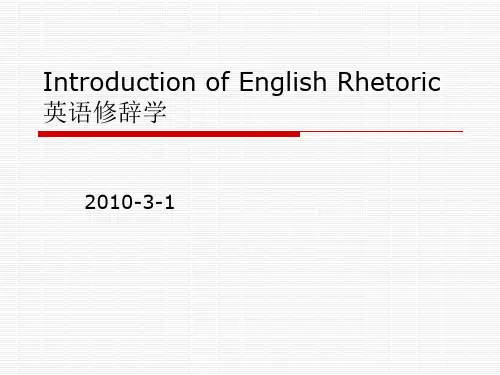
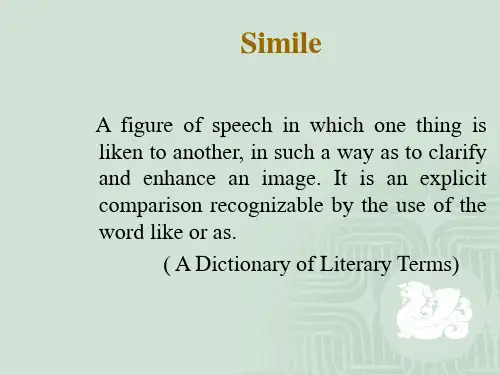
英语修辞学概论读书笔记课程属性:公共基础/通识教育/学科基础/专业知识/工作技能,课程性质:必修、选修一、课程介绍1.课程描述:英语修辞学是研究人类使用英语互相交流、培养英语学习者使用英语进行交流能力的学科。
本课程针对高年级英语专业学生开设,课程内容包括修辞学的若干基本内容:修辞学的定义、三美、五言等基本概念以及西方修辞学理论、视觉修饰以及修辞活动涉及的词汇、句法、段落、修辞格等。
通过课程学习,要求学生掌握英语修辞学的基本理论内容和修辞方法等,并且能够利用这些理论方法对英语学习者过程中的实际问题进行分析,进而提高英语修辞能力,正确而恰当地使用英语,达到学习英语的目的。
This course will introduce the fundamental concepts of English rhetoric, such as the definition of rhetoric, three aesthetic criterion of rhetoric, five cannons of rhetoric. It will provide students with tools to deal with the rhetorical practice at lexical level, syntactic level, textual level. Topics will include western rhetorical theories, visual rhetoric, rhetoric in advertisements. By the discussion on these topics, students will be equipped with the theoretical and practical basis for English rhetoric in English learning with theirrhetorical competence improved, using English properly and appropriately.2.设计思路:本课程引导高年级英语专业学生通过修辞学来探讨和理解由实际问题所驱动的修辞在理论和应用两方面的发展途径。
中国海洋大学本科生课程大纲课程属性:公共基础/通识教育/学科基础/专业知识/工作技能,课程性质:必修、选修一、课程介绍1.课程描述:英语修辞学是研究人类使用英语互相交流、培养英语学习者使用英语进行交流能力的学科。
本课程针对高年级英语专业学生开设,课程内容包括修辞学的若干基本内容:修辞学的定义、三美、五言等基本概念以及西方修辞学理论、视觉修饰以及修辞活动涉及的词汇、句法、段落、修辞格等。
通过课程学习,要求学生掌握英语修辞学的基本理论内容和修辞方法等,并且能够利用这些理论方法对英语学习者过程中的实际问题进行分析,进而提高英语修辞能力,正确而恰当地使用英语,达到学习英语的目的。
This course will introduce the fundamental concepts of English rhetoric, such as the definition of rhetoric, three aesthetic criterion of rhetoric, five cannons of rhetoric. It will provide students with tools to deal with the rhetorical practice at lexical level, syntactic level, textual level. Topics will include western rhetorical theories, visual rhetoric, rhetoric in advertisements. By the discussion on these topics, students will be equipped with the theoretical and practical basis for English rhetoric in English learning with their rhetorical competence improved, using English properly and appropriately.- 6 -2.设计思路:本课程引导高年级英语专业学生通过修辞学来探讨和理解由实际问题所驱动的修辞在理论和应用两方面的发展途径。
英语修辞学Definition of Rhetoric修辞1) The art of using words in speaking or writing so as to persuade or influence others.2) The art of effectively using language in speech or writing, including the use of figures of speech.3) Rhetoric is the theory of informative and persuasive discourse.4) Rhetoric is a kind of art which deals with how to mairpulate language effectively.5) What make an effective choice between two synonymous expressions.6) Rhetoric should study the misunderstanding in human communication and find a solution to it.Historical Background of RhetoricAbout 23 centuries ago, during the time of Aristotle(亚里士多德) in Greece, rhetoric was considered as one of the few.In Aris totle’s Rhetoric it embraced only the following three subjects capable of systematic treatment, namely:1. the possible sources of proofs 2 the style 3 The right ordering of the parts of a speechIt remained so all through the Middle Ages. Even down of the 18th century it was not much changed.◆John Locke(English philosopher of late 17th century): Rhetoric was the science of oratory.What Rhetoric Treats A bout T odayRhetoric is considered to consist of the combination of two sciences, the science of logic and the science of grammar.Both logic and grammar deal with the expression of thought.1. Logic deals with the law of thinking; its aim is to determine what sequences of thought are sound and self-consistent.2. Grammar deals with the forms, inflections, and choice of words and their relation to each other in phrases, clauses(分句), orsentences.Rhetoric is therefore called the art of adaptation(适应性).Francis Christensen:Grammar maps out the possible; Rhetoric narrows the possible down to the desirable and effective.Grammar is law of the language , considered as language.Two types of rhetoric:Communicative rhetoric Aesthetic rhetoricIn Chinese civilization, rhetoric has been primarily written, not oral, due to regional differences in language.Complete sentence & Sentence fragments For example: It was raining hard, he (He)kept on running in the field.Analysis● A complete sentence begins with a capital letter and ends with a period.●Punctuation●Comma, colon:●Period. Question mark?●Semicolon;exclamation mark!Types of Sentences1. Declarative(陈述), interrogative(疑问), imperative(祈使), and exclamatory(感叹) sentence (function)2. Simple, compound(复合), complex(复杂), and compound-complex sentences (structure)● A simple sentence has only one subject and one pre dicate-verb, but it may contain more than one object, attribute or adverbial.有一个主语和一个predicate-verb,但它可能包含一个以上的对象、属性或状语。
英语修辞手法1) Simile:(明喻)It is a figure of speech which makes a comparison between two unlike elements having at least one quality or characteristic (特性)in common. To make the comparison, words like as, as...as, as if and like are used to transfer the quality we associate with one to the other. For example, As cold waters to a thirsty soul, so is good news from a far country./ This elephant is like a snake as anybody can see.2) Metaphor:(暗喻)It is like a simile, also makes a comparison between two unlike elements, but unlike a simile, this comparison is implied rather than stated. For example, the world is a stage./ The diamond department was the heart and center of the store.3) Analogy: (类比)It is also a form of comparison, but unlike simile or metaphor which usually uses comparison on one point of resemblance, analogy draws a parallel between two unlike things that have several common qualities or points of resemblance.4) Personification: (拟人)It gives human form of feelings to animals, or life and personal attributes(赋予) to inanimate(无生命的) objects, or to ideas and abstractions(抽象). For example, the wind whistled through the trees.5) Hyperbole: (夸张)It is the deliberate use of overstatement or exaggeration to achieve emphasis. For instance, he almost died laughing.6) Understatement: (含蓄陈述)It is the opposite of hyperbole, or overstatement. It achieves its effect of emphasizing a fact by deliberately(故意地) understating it, impressing the listener or the reader more by what is merely implied or left unsaid than by bare statement. For instance, It is no laughing matter.7) Euphemism: (委婉)It is the substitution of an agreeable or inoffensive(无冒犯) expression for one that may offend or suggest something unpleasant. For instance, we refer to "die" as” pass away".8) Metonymy (转喻)It is a figure of speech that has to do with the substitution of the mane of one thing for that of another. For instance, the pen (words) is mightier than the sword (forces). 借代(metonymy)是指两种不同事物并不相似,但又密不可分,因而常用其中一种事物名称代替另一种。
高考复习(精品):英语修辞和英语修辞学例子修辞格(Figures of Speech)英语修辞学分为广义修辞学(Broad Stylistic Context)和狭义修辞学。
广义修辞学涉及语体和体裁(Style and Type of Writing)等问题。
狭义修辞学(Narrow Stylistic Context)主要涉及各种修辞手法,即修辞格(Stylistic Devices, Rhetorical Devices or Figures of Speech)的问题。
英语常用修辞格分为词义上的修辞格(Lexical Stylistic Devices)、句子结构上的修辞格(Syntactic Stylistic Devices)和音韵上的修辞格(Phonetic Stylistic Devices)三大类。
(红色为10级讲过)一、Simile(明喻)Simile一词源于拉丁语Similis,意为like。
它根据人们的联想,利用不同事物之间的相似点,借助比喻词(如like,as等)起连接作用,清楚地说明甲事物在某方面像乙事物。
Simile的运用非常广泛,它可借以状物、写景、抒情、喻理,使表达生动形象,明白易懂.(一)Simile的构成Simile通常由三部分构成:本体(tenor or subject)、喻体(vehicle or reference)和比喻词(comparative word)。
如:My love is like a red red rose。
tenor comparative word vehicle注:本体和喻体一般为两个不同类的事物,比喻方可成立.例如:①John is as tall as his father. [Comparative sentence]②John is as tall as a Maypole (五月柱)。
[Simile]例①不算明喻,只是一个比较句,因为John 和his father同类,例②是明喻,因为本体和喻体不同类。